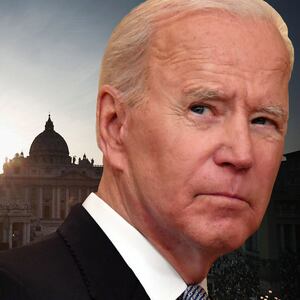With the election of Italy’s most right-wing government since World War II, diplomats are increasingly concerned by the Biden administration’s decision not to fill the U.S. ambassador post in the country—a move that they feel leaves it without the influence necessary to keep a vital European partner in the fold.
The victory of a right-wing coalition led by Giorgia Meloni—who once described the European Union as “rotten to its core” and has praised Italy’s fascist leadership under Benito Mussolini—poses a material threat to the alliance that has successfully united the West, four current and former diplomats told The Daily Beast. Without a permanent presence in Rome, one former ambassador said, the Biden administration risks “losing the voice in the room” best equipped to represent President Joe Biden during a critical moment in European politics.
“One of the most dangerous parts of Trump’s legacy is the way he shredded and deconstructed, and otherwise impaired, not only our reputation and standing abroad, but actual diplomatic infrastructure, including in embassies and multilateral organizations,” the former ambassador said. “So there is added need for a crop of ambassadors who can repair those relationships—particularly in places like Italy, like Belarus, which have seen a sort of… democratic backsliding.”
Italy is the last major European country, and one of only three on the entire continent, without a confirmed U.S. ambassador or a formally announced nominee to serve as the top American official in the country. In February, Axios reported that financier Stephen Robert was under consideration for the post, but seven months later, no nomination has materialized. Many aspiring ambassadorial nominees have been entangled in difficulties over personal and financial disclosure requirements, particularly wealthy political appointees with complex financial holdings.
Multiple diplomats speculated that the post is being held for House Speaker Nancy Pelosi (D-CA), echoing a rumor that has circulated on Capitol Hill for months. Pelosi is still running for re-election to her San Francisco-based congressional seat, but is likely to lose the speakership in the aftermath of the midterm elections—a potential opportunity for the 82-year-old to enjoy a state of “semi-retirement” in one of the most coveted posts in Europe, as one former career Foreign Service official put it.
“She would be a perfect candidate, honestly, if she could be confirmed,” they said, in a rare show of support for so-called “politicals” by a career officer. “But waiting two years to name a nominee to a country that’s backsliding into fascism is borderline malpractice.”
After this story published, a Pelosi spokesman told The Daily Beast that Pelosi has no interest in this position and has not had any conversations with the White House about it.
Historically, the U.S. ambassador post in Rome is considered a plum position for wealthy or influential allies of the president’s—the villa that serves as the ambassador’s residence is an object of particular envy—and longtime warm relations between the U.S. and Italy have typically ensured few diplomatic hiccups. Alumni include investor Lewis Eisenberg under President Donald Trump, litigator John R. Phillips under President Barack Obama, and private equity tycoon Ronald Spogli, who was President George W. Bush’s roommate at Harvard Business School.
But the election of the far-right coalition in Sunday’s snap parliamentary elections could upset the status quo in international relations between Italy and the United States, not to mention the rest of Europe.
Meloni, who began her political career as the vice president of a now-outlawed neo-fascist political party, campaigned to become Italy’s first female prime minister on a populist and traditionalist platform of “God, country, family”—a slogan with deep fascist connotations in Italy—with a particular hostility to immigrants and LGBTQ people. Last month, Meloni tweeted a video of a Ukrainian woman being sexually assaulted by a male asylum-seeker, a video she said was intended to emphasize her pledge to “secure the cities” but which ended up identifying the rape victim.
The victory of Meloni’s coalition is only the highest-profile success of far-right movements in Europe, but comes at a time when the integrity of the pro-West, pro-European alliance is of particular strategic importance to the United States. Though Meloni has vowed to continue Italy’s support of Ukraine as it seeks to expel Russian forces that invaded last winter, her coalition partners have expressed support for Putin and the invasion.
“Putin was pushed by the Russian population, by his party and by his ministers to invent this special operation,” said Silvio Berlusconi, the infamous former prime minister and tax fraudster who is now one of Meloni’s coalition partners. Berlusconi, one of Putin’s oldest allies in Europe, blamed military support for Ukrainian forces by the West for preventing the Russian military from replacing the government of Volodymyr Zelensky “with decent people” and finishing the invasion “a week later.”
Matteo Salvini, another coalition partner who has been photographed wearing a screen T-shirt emblazoned with Putin’s image and the motto “ARMY OF RUSSIA,” has called for rolling back sanctions on the Kremlin and accepted a trip to Moscow funded by the Russian government last May until the “peace mission,” as he called it, was canceled after a public outcry.
With Meloni and these allies soon to be at the helm, one former diplomat told The Daily Beast, the United States needs an authoritative advocate for American and Western interests in Rome “on Day One.”
“When you’re the ambassador, you’re not representing yourself, you’re not representing the State Department, you’re representing the president of the United States of America,” they said. “Your counterparts in your host country, no matter how oppositional or hostile they are to the position of the United States government, are not going to walk away from the table when the president of the United States—or their chosen representative—is seated across from you.”
When asked, every diplomat who spoke with The Daily Beast said that they were confident that Biden’s eventual nominee would be more than qualified to navigate a now-tricky relationship with the Italian government. Biden, a former chair of the Senate Committee on Foreign Relations, has stated that qualifications
“Whatever political appointee he chooses is likely to be very carefully considered in terms of, what’s the case that could be made with their existing skills and experience,” the former ambassador said. “Every president appoints a few of these people who have bundled $50 million, but I don’t think he’s going to put himself in that position, given the challenge that this ambassador is going to face.”
The White House did not respond to a request for comment on what has caused the delay in naming a nominee, but has emphasized in the past that the career Foreign Service officials who man the ship in between ambassadorial confirmations are more than capable of keeping things afloat.
Speaking with reporters on Monday, White House press secretary Karine Jean-Pierre said that she would not “engage in any hypotheticals” about Italy’s future cooperation with the United States, but promised that the Biden administration “ will work with the new Italian government on the full range of shared global challenges.”
But the direct relationship between president and ambassador can be enormously helpful in navigating high-stakes diplomatic relationships, one former senior diplomat said, particularly when a message needs to be conveyed that is seen as being directly from the president.
While career Foreign Service staff can keep an embassy working for an entire term, they said, “the relationship between a president and an ambassador—who outranks every official in the federal government in-country except the president—is a critical line of communication. A chargé [d’affaires] answers to a deputy undersecretary. An ambassador answers to the president.”






